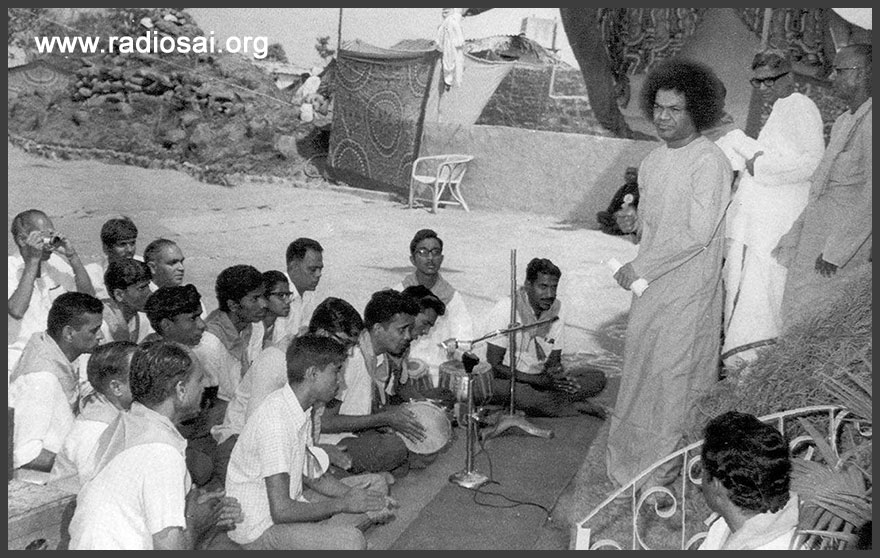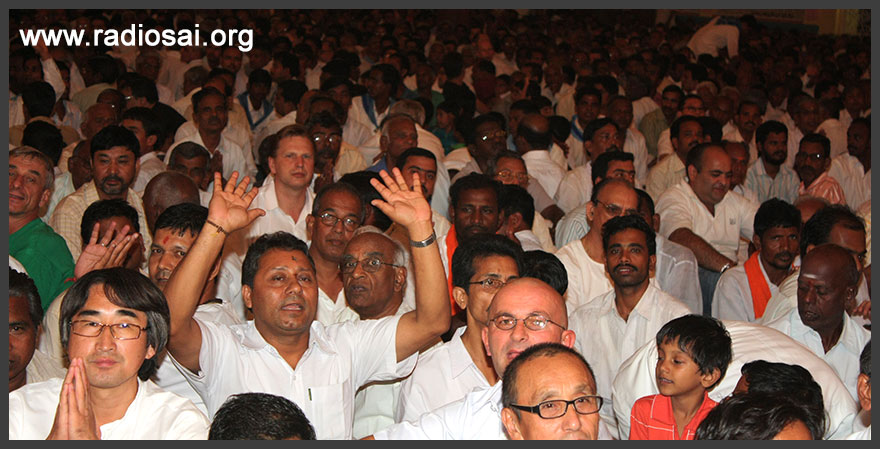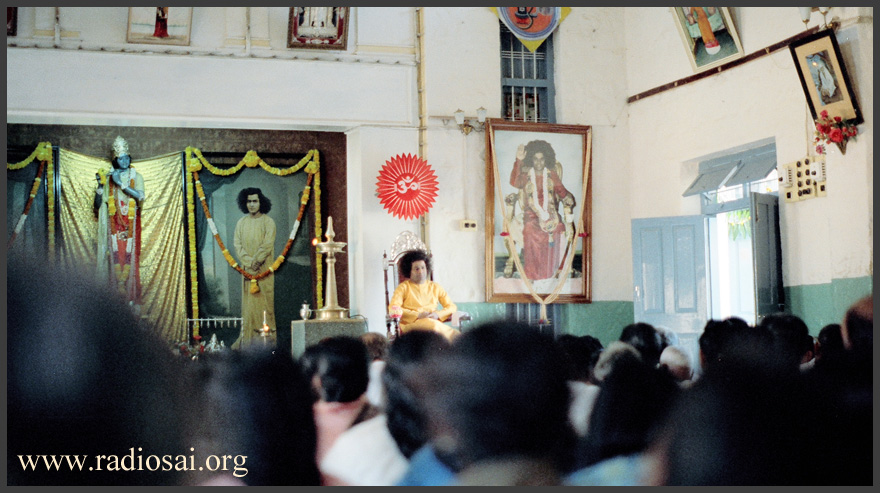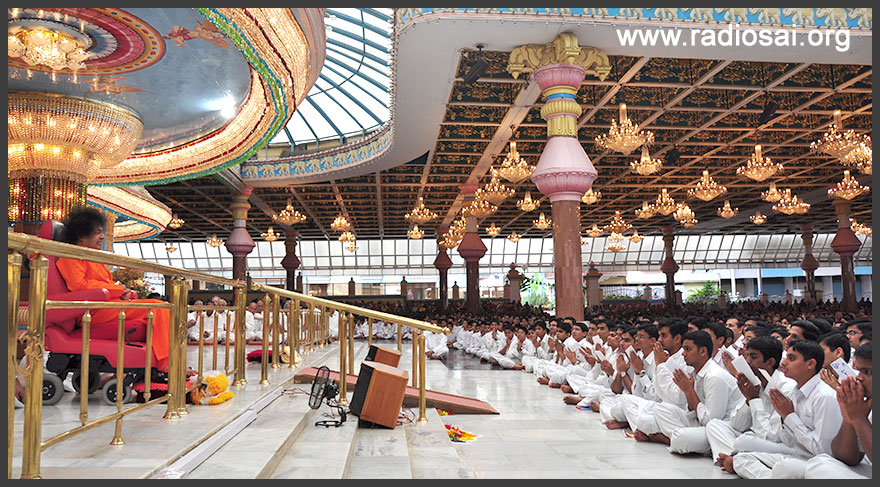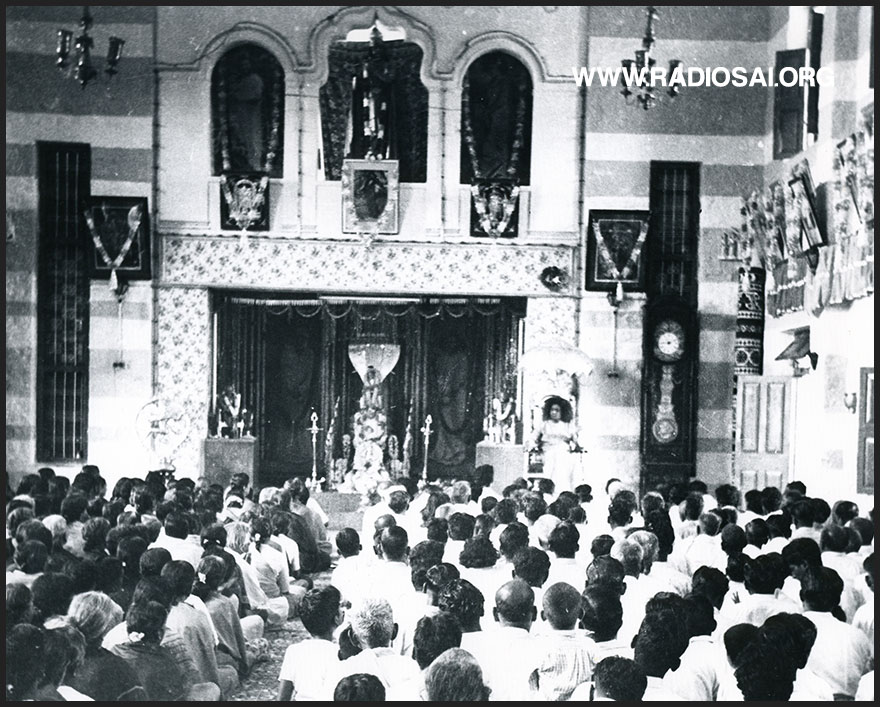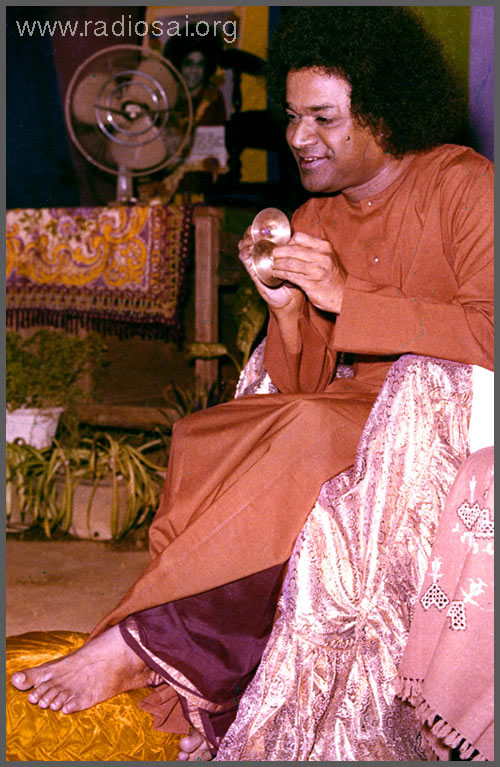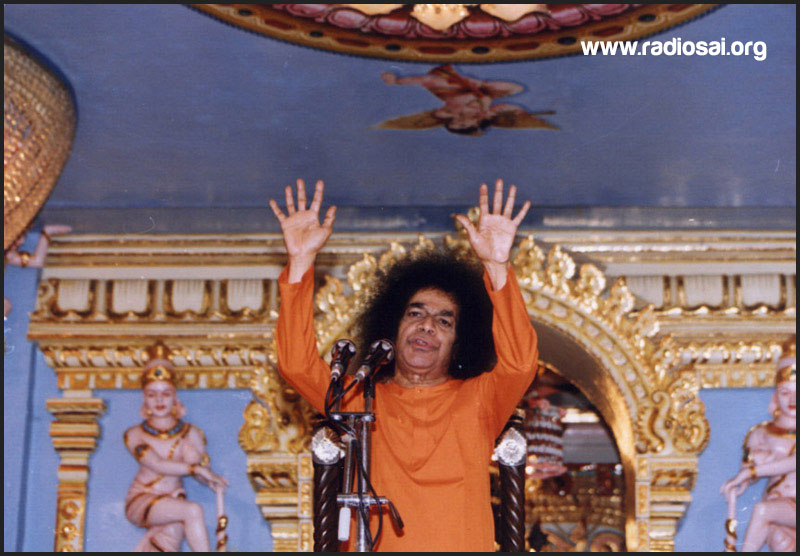|
|
| 'Like' us on Facebook | Follow us: |
Posted on: Nov 10, 2018
Bhajans - The Royal Highway
When lost on a path, or when in search of the right directions, we seek help from one who knows the path. Having found such an individual, we listen carefully to the directions given, and follow them diligently to reach the destination. In the same manner, the aspirant on the spiritual path seeks directions from the Guru, the Guru being one who has traversed the distance and is well-versed with it. Lucky is the person, who finds such a true guide, a Sadguru. What can be told of the fortune of those who get guidance from the 'Goal' itself? That is the supreme opportunity presented to mankind when the Lord Himself, who is the destination of every earnest quest, comes in a human form to guide, goad and guard. His message becomes the guiding post for all of mankind. And being thus universal, it is for one and all - old and young, the vibrant and infirm, the simple and intellectual. One such universal tool that Swami has blessed all of us with is Sankirtana or Bhajan singing. As Swami has said any number of times, we need nothing more to take us across to the goal other than this little lantern of the Lord's name. And when the name is sung, it is as blissful as it is beneficial.
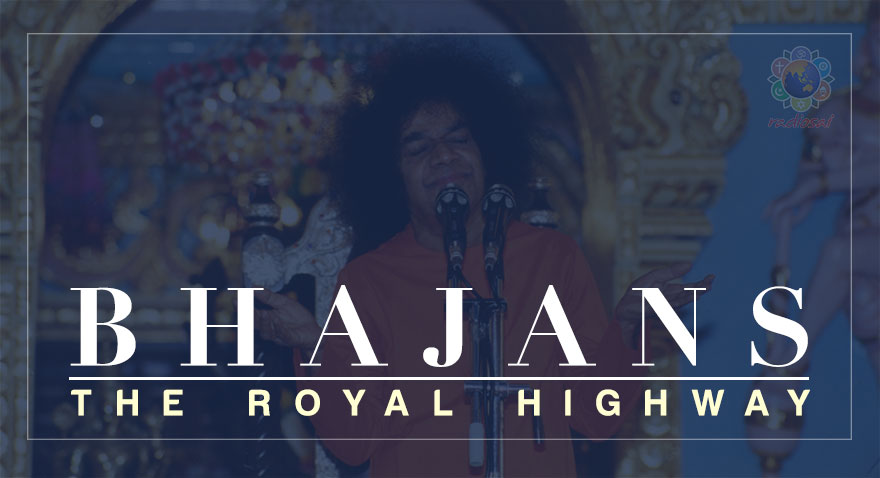 |
To help us all take to this path, and experience the bliss thereof, Swami has made bhajan singing as the single most important Sadhana in the Prasanthi Nilayam ashram. But as Swami would say, these bhajan sessions are only a beginning. It is like the temple lamp from which all can come and light their own. The lamps lit thereby must be kept glowing constantly. So too, the singing of the name should not stop with a bhajan session at Prasanthi, a samiti or a centre; it must become incessant and unbroken. To remind us of this duty each of us owe to our own spiritual quest, Bhagawan instituted the Annual Global Akhanda bhajan, when once a year, the bhajans are sung for an entire day without a break. Even as we all gear up to participate in this year's Akhanda bhajan, we present to you a garland of precious pearls - clips from various discourses in which Swami has spoken about the importance of Namasmarana, Sankirtan and bhajans. Let us internalise these words of Bhagawan. May they become fuel to the Akhanda Jyoti we shall light in our own hearts, and may these words of the Supreme Guide inspire us to sing with such love and vibrance, that the Lord within dances in ecstasy.
When we are ourselves the very Embodiments of Bliss, why do we need to chant the name of the Lord?
There is water in the depths of the earth. If you wish to fetch that water from the depths, what must you do? Between you and the water, there is the soil as an obstacle. That mud or soil signifies the worldly affairs. All those need to be removed. When the mud is removed, we will certainly get the water that is underneath. Otherwise, if you put a bore-well there, it will dig deeper and deeper and get the waters from the depths to the surface. That is remembering the Lord's name, Namasmarana. On your tongue when you put the bore-well of God's name, the happiness in the heart will surface. Therefore, you must make Lord's name dance on your tongue. Whatever work you may do, you must do it with divine feeling. Work will be transformed into worship. Any work done must be thought of as God's work. - Divine Discourse, March 08, 1997 |
| Easier than to master Maya is to call for the Master of Maya
- Divine Discourse, April 22, 1998 |
Why underutilize the sacred faculty of verbal expression? Sanctify it with Sankirtan!
What sin accrues to you when you utter the Lord's name? You sing mean and low cinema songs, what disrespect is there in singing the name of the Lord? You are wasting your life in meaningless songs. Why should you be ashamed to say, 'Rama, Krishna Govinda'? Saying those names, you feel ashamed. But in the streets (you sing), "da da da, da da da..." in meaningless songs you acquire great interests. It is a shame to entire mankind. Had you not been born a human you could've sung anything. But having taken a human life it is a waste to spend one's life in this manner. - Divine Discourse, July 19, 1997
|
Peace cannot be achieved by just an individual's effort. So too, come together, pray together and then the whole world benefits. Samyak-kirtanam itihi Sankirtanam (Singing together in harmony is Sankirtanam) There is a vast difference between Kirtanam and Sankirtanam. Kirtanam is merely an individual activity, and it is an individual's effort for one's own gain. Whereas, Sankirtanam can confer welfare on the entire Universe. Another name for it is Samoohika Bhajana (collective singing). This concept was instituted for the first time by the master of Sikhs, Guru Nanak. Sankirtana would make you to see the unity in diversity. Sankirtanam reminds us of the principle of unity in multiplicity. When all voices come together and the bhajan is sung in unity, it is referred to as Sankirtanam. - Divine Discourse, March 03, 1992
|
Music was created to be offered to the Lord and for one to be lost in the bliss of communion with Him. What is the essence of 'Sankirtana', or singing the in praise of God? To earn the love of God is the essence of music. Merging one's sound, feeling and devotion with sruti-laya-raga-tala (scale, rhythm, tune and beat) and losing oneself in God is the essence of Sankirtana. Recognising the feeling, filling it with devotion, adding love to it, and using sacred words to describe the Lord lovingly is singing. Singing performed without knowing the meaning of the words, without filling it with feeling, without infusing with love, is comparable to the music emanating from a tape recorder or a gramophone. - Divine Discourse, March 03, 1992
|
A Prayer sung is a prayer heard for sure. The sweetness of God's name when rendered as a song, attracts the heart. Many pundits express in the form of verses. They may know to express in a verse or Sloka form but they cannot remove the Shoka or agony. Few others like actors may use the words well and deliver them majestically. Even this is incapable of attracting feelings. But through singing, the heart can be made to relish the essence of the feelings. Be it theists, atheists or any such, they too would unconsciously nod their heads to the melody of songs. Using words, we can render a verse, "Rama! Please protect me". But this is not such that it can capture the heart. Similarly, merely delivering the words (like a dialogue), "Oh Rama, save me", is not so appealing to the heart. But the same when rendered as a song, (Swami sings the same words) how it pulls the heart, how it attracts the heart! So much sweetness permeates music and song. - Divine Discourse, March 03, 1992
|
What are the various types of Sankirtan and why are Sai Bhajans special?
This Sankirtana is of four types. One is Guna Sankirtana (singing about the qualities of God), second is 'Leela Sankirtana' (singing about the divine acts of God), third is 'Bhava Sankirtana' (singing expressing one's feelings to God) and the fourth is 'Nama Sankirtana' (singing the various names of the Lord). Guna Sankirtana means describing the auspicious qualities of God, feeling ecstasy and striving to inculcate such noble qualities in one's own life. This 'Guna Sankirtana' was practiced by Tyagaraja. Rama, Your prowess is beyond description by words! |
The paths are many, but which is the best path for the present times?
Embodiments of Love! Sankirtan or singing the praises of God is a very sacred path. We may not know the tune or raga, but the word raga has another meaning too, 'liking'. You chant the name with fondness, chant the name with love. So chanting the name of God is very essential. In this Kali age, there is no path better than that of Namasankirtana or singing the lord's name. In age of Kruta it was meditation, in Treta ritual sacrifices, in Dwapara age worship and in Kali age it is namasmarana, chanting of the Lord's name. Therefore, recognising the truth that chanting is the means for redemption, one must practise it. - Divine Discourse, March 03, 1992
|
The best way to redeem our life is to sing the glories of God
In this entire world there is none who does not chant the Lord’s name. They remember God in some form or the other. They might name their children after God and call them. If not, they at least do so by taking their friend's names, “Hey Rama come here, Oh Krishna come here”. In some way they take the Divine name. Hence a place without God’s name cannot be seen. All forms are that of God; all names are names of God. Hence chanting any name, singing the Lord’s name you must redeem your life. Using your imagination, you can describe God in any way. That is your satisfaction. That is your imagination. But the name nevertheless is the Truth. What greater penance can there be other than having the name of the Lord dance on the tongue, at all times! |
| comments powered by Disqus |


